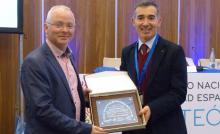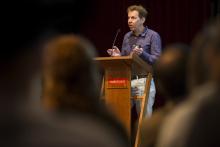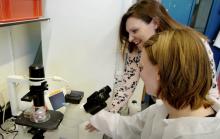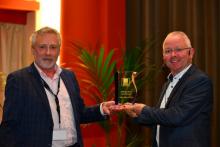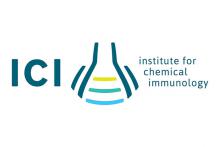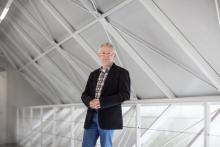News
Professor Albert Heck, Utrecht University and member of the ICI executive board, has received an honory membership of the Spanish Proteomics Society. Heck was honored during the Opening Ceremony of the 6th Congress of the Spanish Proteomics Society in Cadiz on November 15th 2016.
On the picture Heck receives the award from Angel García, President of the Spanish Proteomics Society.
Ton Schumacher, ICI executive board member and group leader within the division of Immunology at the Netherlands Cancer Institute, has been named recipient of the 2016 William B. Coley Award. This prize is awarded yearly by the American Cancer Research Institute (CRI). It was instigated to honor scientists who have made highly important contributions to the field of cancer immunology.
The Berkers group (Utrecht University) combines Metabolomics – studying the small molecule metabolite profile of cells using Mass Spectrometry – with biochemical and chemical biology techniques. By comprehensively profiling metabolic changes in either drug resistant cells or in specific populations of immune cells, the group aims to identify novel targets for therapeutic intervention. In this video, ICI researcher Celia Berkers talks about her research and ambitions. Have a look!
The Dutch Society for Mass Spectrometry (NVMS) has honoured Albert Heck with the Outstanding Research Award 2016. Heck received the award for his many excellent contributions to the field of Mass Spectrometry. Heck is Professor of Biomolecular Mass Spectrometry and Proteomics at Utrecht University, and Scientific Director of the Netherlands Proteomics Centre and the large-scale research facility Proteins At Work.
The Netherlands Cancer Institute (NKI) together with the Amsterdam Biotherapeutics Unit has entered into a collaborative reseach agreement with Neon Therapeutics, an immuno-oncology company developing neoantigen-based therapeutic vaccines and T cell therapies to treat cancer.
On April 1, 2016, the second Chemical Immunology Conference of the Institute for Chemical Immunology will take place in the Rode Hoed in Amsterdam.
Within five years, the first hospitals should be able to completely analyse all of the proteins in a patient’s blood and urine in order to provide more individualised treatment. That is the ambition of the researchers at Utrecht University and their four European partners. The researchers have received a 3.7 million Euro grant for their MSmed research proposal as part of the Future and Emerging Technologies programme within the Horizon 2020 project. On 14 and 15 January, MSmed officially kicked off its activities at an event in Copenhagen.
ICI researcher Carl Figdor (Radboud UMC, Dept. of Tumor Immunology, theme Cancer development en immune defence) received a novel EU 2020 grant named PRECIOUS to develop biodegradable nanomedicines for multimodal precision cancer immunotherapy. In this five year program (8.3 Million Euro’s) the team will produce nanoparticles filled with compounds that manipulate the immune system and test these in the clinic.
In a paper in Chemical Science, ICI PhD student Daphne van Elsland (Leiden University) and colleagues have combined two techniques that together enable visualization of bacteria being degraded by immune cells.
Ton Schumacher (Netherlands Cancer Institute and ICI executive board member) has received the Meyenburg Award 2015 on Wednesday, September 11th.
The award is established by the German Meyenburg Foundation, which aims to stimulate excellence in cancer research. The prize is awarded annually to an internationally acclaimed scientist for his or her outstanding achievements. Schumacher receives this award in recognition of his research on T cell recognition of human cancer.


